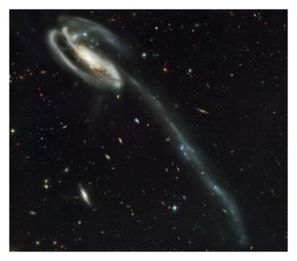
Material stripped from a galaxy during its collision with a smaller galaxy (seen in the upper left corner of the larger interaction partner) forms a long tidal tail. Young blue stars, star clusters and tidal dwarf galaxies are born in these tidal debris. These objects move in a common direction within a plane defined by the orientation and motion of their tidal tail. A similar galaxy interaction might have occurred in the Local Group in the past, which could explain the distribution of dwarf galaxies in co-rotating planes.
Satellite dwarf galaxies at the edges of the Milky Way and neighboring Andromeda defy the accepted model of galaxy formation, and recent attempts to pigeon-hole them into the model are flawed, an international team of scientists reports.
The mismatch raises questions about the accuracy of the standard model of cosmology, which is the widely accepted paradigm for the origin and evolution of the universe, the astrophysicists say.
A preprint of the research paper, accepted for publication by the Monthly Notices of the Royal Astronomical Society, is online here.
The standard model, also called the "lambda cold dark matter model," says that satellite dwarf galaxies in the Milky Way and Andromeda are expected to behave a certain way: The galaxies would form in halos of dark matter, be widely distributed and would have to move in random directions, said Marcel Pawlowski, a postdoctoral researcher in the astronomy department at Case Western Reserve University and lead author of the new study.
"But what astronomers see is different," Pawlowski said. "We see the satellite galaxies are in a huge disk and moving in the same direction within this disk, like the planets in our solar system moving in a thin plane in one direction around the sun. That's unexpected and could be a real problem."
"There's a very serious conflict, and the repercussion is we do not seem to have the correct theory of gravity" said Pavel Kroupa, a co-author of the study and a professor at the University of Bonn in Germany.
Read more at : http://www.sott.net/article/280362-We-do-not-seem-to-have-the-correct-theory-of-gravity-says-professor
 RSS Feed
RSS Feed